October 6, 2008
We’re still in summer here, though we had a couple of days of delicious fall weather, and even a few drops of rain. But tomorrow is expected to hit the mid 90s again, and I’m tired of summer. Anyone need some warm air? Can I ship it to you by overnight express?
Oh well. Provided we don’t have wildfires like last October, I’ll be happy and relieved to just need to wear shorts a little longer.
I’m not sure what’s going on with my not blogging more. I hope you keep checking back in case I have a burst of inspiration. There just hasn’t been anything to post that seemed as if it would interest anyone else. Heck, some of it didn’t interest me.
I have been reading a lot that interests me, mostly nonfiction, and most of it of little general interest. I’m a bit eccentric in my tastes, I think. A few weeks ago I enjoyed an excellent book of slightly more general interest titled, Inner Work: Using Dreams and Active Imagination for Personal Growth by Jungian analyst Robert A. Johnson, on dream work and active imagination.
I’m sure I’ll get gabby again one of these days… Until then, take care.
Gone fishing reading.
— Barbara @ 4:15 pm PST, 10/06/08
May 30, 2008
Mystery author Eric Mayer* mentioned in a recent blog post that his blog journaling hasn’t been very habitual of late. He went on to write about habits, and that got me to thinking about my habits, and how they’ve changed in the past year or so. Obviously, for me, blogging has taken a back seat to other things. So has my fiction writing, other than attempting to sell my latest finished manuscript, a mystery about a tarot reader whose awakening ability as a medium gets her involved in a murder investigation. (Interested agents or publishers are welcome to inquire here.)
Habits can be good or bad, and I’m sure everyone has some bad ones they’d like to unload. But one new habit I’m happy to have taken on this year is gardening.
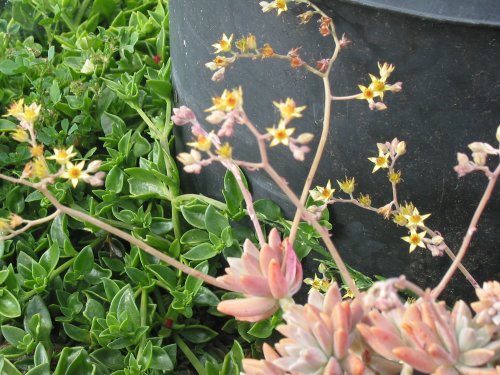
Gardening is indeed a habit, one that gets into your blood in a way I didn’t anticipate when I started out this year. I’d done a tiny bit of gardening as a kid, when I remember planting one rose bush of my own but mostly helping my grandmother with her strawberries and vegetables on the embankment behind my parents’ house. Later, in my first apartment, I nurtured a few houseplants, and throughout my work life I’ve usually kept a potted plant on my desk. I kept African Violets in a north facing window in the last house we rented, until a cat took over that window sill. Still, my husband did most of the outdoor gardening, with a little weeding here and there on my part, until March of this year.
It started this spring with tending a few vegetable and flower seeds until they sprouted, and then the seedlings until they went into the ground. From there I progressed to caring for plants in the ground and preparing the soil for more of them. It’s rapidly expanding to a succession of all of these things, in the hopes of keeping some fresh produce in our salad and veggie bowls through this summer, as well as brightening a corner of the front yard, where my ultimate goal is to keep flowers blooming in a little cottage style bed year round. I’m a ways from that goal yet.
I’m still new at this, and I got a late start this year, but I get help and advice from various sources, and gardening is now a firm habit that I won’t easily give up. It’s one of the first things I think about in the morning and one of the last I think about before the sun goes down.
The plants seem happy about my gardening habit, when they can figure out what season it is. Our weather this spring switched back and forth for a couple of months from one extreme to the other, first dry Santa Anas with temperatures in the 90s, and then thick cloud cover and a shifting Jet Stream chilled the air to the 50s. This went back and forth for weeks, with little pleasant weather in between, and it kept our plants confused. In the past two weeks the weather has leveled off, and the plants are loving it.
They say beauty is in the eyes of the beholder, and I’ve recently realized there’s little more beautiful to me than a tiny plant bursting out of its seed container. Call me crazy, but I think baby plants can be almost as cute as a kitten, and they, like the kitten, draw out my mothering tendencies.
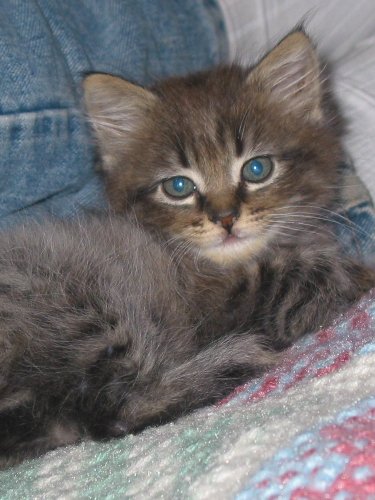
(I’ll bet you expected a photo of a seedling, but I couldn’t help the obligatory kitten shot.)
To some this pleasure might seem like taking joy in watching paint dry, but to me it’s more like watching a sunset at the end of a heat wave.

We celebrated our first avocado blooms a few months ago.

Now some fruit has set, which we hope will grow to maturity.

Avocados, according to my resident expert Ken who’s read something like 200 online agricultural reports about them, tend to drop a good portion of their fruit early, which can be disappointing to home gardeners. It will be disappointing to me, if it happens, because Reeds are my absolute favorite avocado variety.
Two days ago I celebrated my first squash blossom.
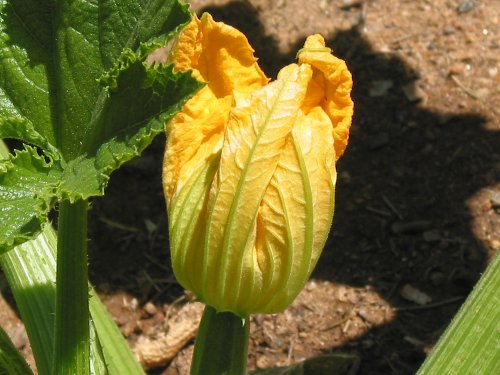
Zucchini may seem an ordinary thing to seasoned gardeners. It’s one of the easiest things to grow and the butt of gardening jokes, usually in reference to an overabundance of it. But I like zucchini, I love my resplendent squash plants with their huge green leaves, and those yellow-orange blossoms are gold to me.
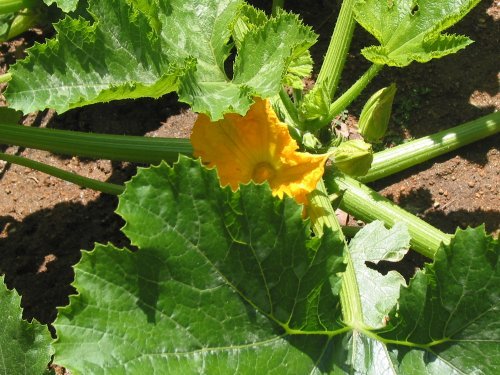
I’m learning more about the various weeds that grow in the garden, some of which are edible. For instance, purslane and dandelion make delicious salad greens. Note, if you decide to try eating weeds from your garden, be careful that you know what you’re eating. Ensure that the plants haven’t been subjected to herbicides or pesticides and that they aren’t in fact toxic weeds.

Even some semi-edible weeds, like the sour grass we all discovered as kids, can be a problem if eaten in quantity, I’m told, and purslane looks very similar to a toxic type of spurge that often grows right alongside it. Have an expert show you how to identify edible weeds, and examine carefully whatever you pick to eat. This point was driven home to me when I found spurge, with its milky sap, growing in my own little purslane patch.
Yesterday Ken pointed me to a Los Angeles Times article about Guerrilla Gardeners, which linked to a slide show on how to make “seed bombs” as well as two blogs, here and here, about guerrilla gardening.
Gardening has not only revolutionized my daily routine. It’s apparently a revolution that’s spreading once again, as Victory Gardens did in the last century, with people today gardening to save money on local food and working on a clandestine volunteer basis to re-green the land.
_ _ _
* In case you aren’t aware, Eric Mayer and Mary Reed’s latest John the Eunuch Byzantine mystery, Seven For A Secret, was released in April by Poisoned Pen Press. If you haven’t kept up with their historical mystery series, it’s not too late to start. The earlier books in the series are still in print, and some are now available as Kindle editions.
— Barbara @ 3:27 pm PST, 05/30/08
March 9, 2008
A few days ago the New York Times ran a story headlined Gang Memoir, Turning Page, Is Pure Fiction, about Margaret Seltzer, alias Margaret B. Jones, and her memoir that wasn’t a memoir at all. She has admitted it was fiction. Today Alternet reports on yet another memoir writer who lied, in Literary Frauds Strike Again … and Again.
So, let’s see if I understand this. We’re supposed to sell our fiction as memoir now? Is that what I’ve been doing wrong? Is this what they mean by creative nonfiction? I’m confused.
I guess the little hand slap mainstream media gave James Frey, not to mention his second book contract, weren’t very good deterrents to the hot new trend in books — memoir fraud.
Readers expect a memoir to be true, if from a limited perspective of the writer’s personal experience and memory of events, which can of course be slightly skewed. We don’t all remember events that happened when we were growing up the same way our siblings or parents remember them. Obviously a lot of other nonfiction is opinion, or facts mingled with theories, presented from a single biased viewpoint. But a memoir isn’t supposed to be deliberately made up and then presented as the author’s own story. That’s called fiction.
These so-called memoir authors sold what they wrote as their own life stories, when they knew the stories either weren’t true or weren’t their experiences. They could’ve called their stories novels, or fictionalized accounts, but they didn’t. They called them memoirs. Some of them (Frey, at least) made a lot of money.
I don’t know about you, but when I spend hard-earned money on a book, my expectations are still pretty high. Those expectations are being fulfilled by books less and less often these days. I’m starting to think it’s no wonder people are reading fewer books, and I think the problem boils down to simple greed.
We all need to make a living. But most of us try to work hard and put in an honest effort at something for our living. We don’t resort to cheating, theft, fraud, and sloppy ethics. So who’s to blame here? Are these people just laughing at all us dummies who bother to actually be honest about our work? Laughing all the way to the bank?
The LA Times has published another opinion on why this type of thing happens in Why we fall for the fakes, an editorial that blames not just the writers, but the publishers, and finally the readers who keep purchasing these books.
What do readers think about this? If you pick up a memoir to read, do you want to know the person is at least attempting to be honest and accurate? Do you want to believe the publisher did their part in making sure they weren’t helping to perpetrate a fraud, or even instigating it? Do you think the writer is making a promise he or she is responsible to keep? Or when you pick up a memoir do you expect a certain amount of fiction?
What do you consider getting your money’s worth from a book? What are your expectations of authors and publishers as far as honesty? Are consumers partly to blame when we keep buying and don’t demand quality and integrity from the companies selling us products? Are we the readers to blame for books that fall below standards in either quality or integrity? Are we voting with our dollar for dishonesty? Or is that just an easy excuse for those who knowingly sell us shoddy or misrepresented products? Isn’t that blaming the victims, something like the purse snatcher saying, “Well she was just walking along the sidewalk. What was she doing there if she didn’t want it stolen?”
Perhaps most important of all, how does this make you feel about telling young people they should read more books?
— Barbara @ 11:40 am PST, 03/09/08
September 27, 2007
I was thrilled a few weeks ago to be asked to contribute some of my thoughts about blogging to a project called, Blog Your Book to the Top. It’s an ebook published by CyberBookBuzz to help authors use blogs to promote their work.
What little I know about that apparently went over well, so I’m one of the 15 authors whose blogs and tips are featured in the book. You might want to take a look, if only for tips from others who know far more than I do about using a blog to promote their work. Nancy Hendrickson, who asked me to take part, is a freelance writer in San Diego and creator of Blogging Authors and Book Talk Radio. She’s included dozens of great tips about author blogging, and blogging in general, in Blog Your Book to the Top.
One of my particular thrills resulting from this project is to see my name on the summary page for the book — on the same page as a blurb by Jessica Macbeth, author of The Faeries Oracle. Her excellent book accompanies Brian Froud’s Faeries Oracle cards, which I love so much that after I lost my first deck last year I immediately bought a second one.
How cool is that?
— Barbara @ 10:59 am PST, 09/27/07
August 1, 2007
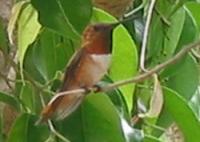
According to my old bird guides, one of which dates back to a field biology class I took at eighteen or nineteen, this little guy isn’t supposed to be here. He’s supposed to be anywhere from Northern California to Alaska. But here he is, in Southern California. (Notice how we Californians capitalize the two regions, as if we wanted to be two separate states, like the Dakotas or the Carolinas?)
Anyway, he’s in the wrong place, I think. If it’s time for Rufous Hummingbirds to migrate to winter grounds, he’s supposed to be in Mexico, or on his way there. This feisty little Selasphorus rufus has claimed the territory around our feeder during the past two days. I’ve been paying attention to hummingbirds all my life, and we’ve fed them for years, here at the north end of the county and in the city of San Diego, but we never saw a Rufous before, at least not closely enough to identify it. With no green on his back (see below), he’s definitely a Rufous.

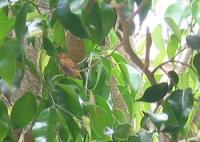
My photos don’t do him justice, though they might if he would sit still for a few seconds and let me focus. He’s a glowing reddish gold with an irridescent scarlet throat that could stop traffic. He’s faster than any of the other hummingbirds, and he doesn’t let them forget it.
Maybe his range has been thrown off by global warming, as this Smithsonian site seems to hint, or perhaps they’ve always been around and I just haven’t noticed.




— Barbara @ 6:12 pm PST, 08/01/07
July 9, 2007
Gloria Steinem: In Defense of the ‘Chick Flick’:
“I propose, as the opposite of “chick flick,” films called “prick flicks.” Not only will it serve film critics well, but its variants will add to the literary lexicon.” (read article)
Maybe the term “prick” is too strong. It’s not the word I would’ve chosen, yet it answers the fact that a lot of women are put off by the tone and expression, if not the word, used when we hear the term “chick flick.”
Steinem’s editorial reminds me of something that occurred in a “Modern Fantasy” literature class I took, back in the seventies, when Mary Stewart’s first two Merlin and Arthur novels, The Crystal Cave and The Hollow Hills, were recent bestsellers. One of the young men in the class was so taken with them, he asked what other books Mary Stewart had written. I told him she’d written mostly romantic suspense in the past. I had an entire collection of her books at home, older hardcover editions gleaned from thrift store shelves. I thought when he expressed an interest that here was another new fan. But when the young man heard the word “romantic,” he took on a look of utter distaste and lost interest.
Some female mystery novelists still publish today using their first and middle initials rather than their full first names, in order to stretch past that still-existent gender barrier in many male readers’ minds, a practice reminiscent of the Brontës publishing under masculine names. One would’ve hoped that by the time this century rolled around we’d have advanced further. I don’t have statistics on this, but I’ll hazard a guess that there are more women who read and write fiction containing a predominately masculine point of view than there are men who read or write fiction containing a predominately feminine point of view.
Yet I know women, myself included, who enjoy a good action film, of the type once considered a favorite of men. Why is it that women, both in their reading and writing, as well as in movie preferences, might more readily cross old gender barriers?
Mind you, many men do take an equal interest in less violent or less action-oriented movies and books, and I admire men who are open to genres and interests considered historically feminine. I also admire women who open up more to interests previously considered masculine. More women today are sports fans than ever before, and don’t restrict their interests, as I do, to figure skating. My lack of interest is mostly due to bad experiences in physical education classes — I was that awkward, non-athletic kid always picked last for the team. It has nothing to do with my admiration of any outstanding achievement, physical or otherwise, and I enjoy watching good sports-related movies.
What is it that continues to keep some men from enjoying what they term as “chick flicks?” Is it that they truly don’t enjoy more thoughtful, slower-moving, or less action-oriented stories, once they give them a chance? Or is there another reason? Is it adrenaline addiction? (Understandable, among men and women, in today’s world, though perhaps best not encouraged.) Is it fear of what their friends will think? I’m trying not to make assumptions here. I’d really like to know, especially as a female writer trying to sell my fiction.
We all have types of stories we don’t like, or even parts of movies we like that we could do without. I personally back away from anything about child abductions, gangster movies that are overly violent onscreen, comedies that resort to tasteless bathroom humor (bathrooms have doors for a reason), and horror with too much blood and gore added for shock value. As far as I’m concerned, vomit and excrement belong off-screen. There’s enough of them in real life, and they’re not entertaining. They’re certainly not the kind of realism I’m looking for in a story.
I can understand someone not liking romance, even though I usually enjoy it provided it’s not overly sappy. But no one’s personal preference for certain types of stories and not others explains why we need the term “chick flick,” and especially not why it so often seems to be used as a derogatory term. Do the men who don’t like “chick flicks” prefer movies with only men? Is that what it boils down to?
I’m reminded of a line from Frank Herbert’s Dune regarding taking the “waters of life.” It mentions the place in their minds the Bene Gesserit mother superiors (women) fear to go, a place they believe only the fabled Kwisatz Haderach (a man) can access. The Kwisatz Haderach, once he accesses that place, becomes a superior being destined to lead his people to freedom. I wonder about the allegory Herbert intended, if any. Is there a place like that inside the female psyche, where some of the toughest men fear to go? Is that what they fear about “chick flicks?” Will they gain power if they find a way to access that, or will they lose power, possibly even die, as many men did who attempted to become the Kwisatz Haderach? Or will they simply gain a broader understanding of life and the world around them? In that case, maybe it’s worth a shot.
Gloria Steinem makes an interesting observation about power, and about nouns and adjectives in labels:
“Just as there are “novelists” and then “women novelists,” there are “movies” and then “chick flicks.” Whoever is in power takes over the noun — and the norm — while the less powerful get an adjective. Thus, we read about “African American doctors” but not “European American doctors,” “Hispanic leaders” but not “Anglo leaders,” “gay soldiers” but not “heterosexual soldiers,” and so on.” (read article)
— Barbara @ 1:35 pm PST, 07/09/07
July 7, 2007
A post by Susan at Spinning reminded me of a book I recently read, written by the Dalai Lama — The Universe in a Single Atom: The Convergence of Science and Spirituality. The Dalai Lama has nurtured a lifelong interest in science, and this book explores the gaps and meeting places between religion and science, in what I found to be a thoughtful and profound treatise. It was interesting to read how a religious leader views science, which sometimes threatens his long held beliefs and at other times seems to support them. Granted, Buddhism is one of the least dogmatic religions, and Buddhists don’t believe in a personal God or a specific creation myth, as far as I can discern from this and other readings, so he tends to be much more flexible toward science than other religious leaders might be.
I’ve often seen science as exploring the underpinnings, materials, and physical characteristics of the same great work of art (the Universe) that religious leaders and philosophers explore the ideas and impulses behind. Both, at their best, explore the best ways to live within that great work. To me their goals seem to mesh perfectly, so long as greed, dogma, and power plays don’t get in the way. But then I don’t have a set religious belief to try to fit everything into. I think the more set in concrete one’s beliefs are, in either science or spiritual teachings, the more difficult it may be to see the common ground and bridge the gaps. Flexibility is important, and we already know that some of the greatest scientific discoveries are results of either accidents or imagination. Einstein considered imagination more important than knowledge —
“I am enough of an artist to draw freely upon my imagination. Imagination is more important than knowledge. Knowledge is limited. Imagination encircles the world.”
Perhaps the most important way we’re made in any creator’s image is that we’re creative ourselves. It’s that very imaginative nature that can enable us to be flexible and love the mystery of life, rather than try to impose steadfast answers on others.
— Barbara @ 12:32 pm PST, 07/07/07
July 5, 2007
I decided to answer your comments in a new post, since some of my responses are lengthy. You’ve given me a lot to think about and helped me reconsider my feelings about critiques. Even though I disagree with some points, as they relate to my writing at this time, you all shared wisdom that deserves attention. (more…)
— Barbara @ 7:33 pm PST, 07/05/07
June 8, 2007

Beverly Jackson recently honored me by including my name in her Thinking Bloggers Awards. She should be listed in mine, because she’s inspired me so much in the time I’ve known her, through her writing, painting, and poetry, as well as her perspectives on other poets and life. It’s Southern California’s loss that Bev recently moved to North Carolina, where she’s exploring her new home region and sharing her experiences via her blog.
I’ve chosen my five Thinking Bloggers with great difficulty, because I read many more than five blogs that deserve mention on a regular basis. All whose blogs I read are people who make me think on a regular basis. Many also share another special quality: In one of my favorite movies, Under The Tuscan Sun (a highly-fictionalized adaptation of the Frances Mayes memoir by talented screenwriter Audrey Wells, who also brought us Shall We Dance and The Kid), free-spirited Katherine (played by Lindsay Duncan) keeps reminding her American friend Frances (Diane Lane) of the advice she got from Federico Fellini, to never lose her childish enthusiasm. Good advice, in my opinion. Childish enthusiasm is a quality I greatly admire in people, maybe because mine is sometimes in short supply, so I need regular booster shots. It’s a trait that tends to be present in most of the people whose blogs I return to. (more…)
— Barbara @ 2:02 pm PST, 06/08/07
April 13, 2007
Has it been more than a week already since I posted? I lost track of time during my panic of the past few days. The other night, after a glitch occurred when I ran my backup program, I thought I’d lost all my files for my current book in progress. Panic ensued, while I scrambled to find and undelete the files. I spent almost 24 hours straight on that, with little sleep, piecing together fragmented files, hoping I still had a complete book there. Finally I came across the directory on the backup computer where my backup program had stored a complete second archive of everything — perfectly intact and up to date, including every last minute of my work on the book.
All that panic because I was too dumb to know my backup program stored an archive of deleted files, and because I had allowed too much other garbage to backlog on my hard drive. (The glitch occurred when that particular hard drive filled up.)
I could sit here and ask why me, or rather ask why I do this to myself, but I’m too busy getting back to normal and on with work. Still, it seems that I go through this sort of panic on a regular basis. It happened two years ago when my old laptop gave out and I lost work that I hadn’t yet backed up. This time it resulted from the backup process itself.
Once I’m finished with this book and it’s off getting a look by some agents, I plan to spend a few weeks getting my life in better order, including both paper and digital files, to prevent future panic episodes.
But one thing I noticed during all of this was that I don’t tend to print out what I’ve written as often as I used to. In spite of what might’ve been lost, overall I consider that a good thing, a good sign that I’m making my personal transition from paper to a digital world.
I admit to some affection for the paper world. It’s what I grew up with, and where I found my love of books and the written word. There is still something sensual to me about the feeling of pen and paper or a book in my hands. I like the shape of the book, the weight of it, the toothy or smooth texture of paper, even the smell of ink, paper, and binding materials. I still recall with nostalgia the particular smell of the book I was handed in third or fourth grade when we studied the culture and geography of Japan. Ever since, I’ve looked for similar qualities each time I open a new book. All these things make letting go of the paper world a clingy process.
At the same time, I love trees. Because of that, I’ve always been troubled that my chosen form of expression — writing — has a history of felling so many trees. So when I went through my computer files and some paper files over the past few days, I was pleased to realize that I recently have less tendency to print as I write. I used to feel a need to print out what I’d written more frequently, to edit or proofread on paper rather than onscreen, or just to get a sense of what the printed story would look like.
Maybe it’s so many years of writing on a computer that’s changed this. Maybe it’s the laptop’s portability and reduced glare being easier on my eyes. Maybe it’s no longer having a job that requires me to stare at a screen all day and then do the same all my evenings and weekends for my fiction writing.
Maybe it’s blogging. The immediacy of blogging tends to encourage me to edit onscreen. My blog is even set up now so I can view what I write in two or three different fonts before I post it, which I think aids the onscreen editing and proofreading process.
Maybe it’s a combination of all those factors. It’s interesting to note that more publishing venues have opened up to electronic submissions just since the CRT monitor has begun to vanish. Hopefully the less glaring monitors that are replacing them will be much easier on all our eyes, and continue to save more trees.
I still write a good half of my personal journal pages by hand, and I still use handwriting to jump-start or unblock my writing process. This blog post is in fact a segue from my morning pages. But my journal pages don’t get reproduced, except by typing them into a digital format, and they’re unlikely ever to be published in book form. The paper is eventually recycled if they do become digital, so I’m not as concerned about my journal pages killing trees. At least that’s what I like to tell myself.
Now if we can get the ebook technology to the point where fewer paper books have to be printed, at least for popular fiction, then we’ll have made real progress in taking publishing from deforestation for profit to a more pure form of edification, expression, and entertainment. Of course there will always be uses for paper. I can’t think of a better way to keep certain legal documents or accounting records, right now, though that’s not a world I work or have much expertise in. There are also some types of books that just work better, for now, on paper. One that comes to mind is the coffee table variety, with color plates of artwork or photography. But the less trees cut down for paper and books, the better.
Even if what this Guardian Unlimited article says is true, that planting more trees in temperate latitudes won’t help assuage global warming, it also states that destroying more trees isn’t the answer, that the greater need, and indeed our motivation for attempting to slow global warming, is to preserve ecosystems, including but certainly not limited to our own.
Perhaps my panic over my files had some value. It got me not only to change what I file away on my computer and how I back it up, but also to take a hard look at how I use paper, to keep heading along the road I’ve started down, of conserving wherever it’s reasonable, and wherever I can.
— Barbara @ 2:16 pm PST, 04/13/07
















